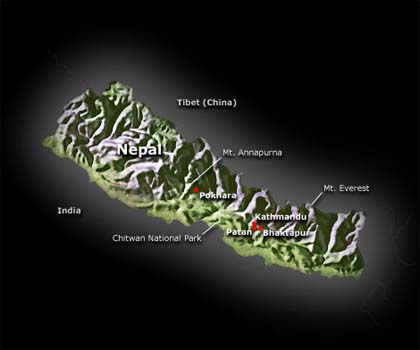Indian leads blood bath at Nepal's sacrifice fair
 Kathmandu, Nov 24 - A prosperous farmer from India's Bihar state led the bloodbath at Nepal's largest animal sacrificial fair Tuesday, ignoring calls for non-violence from animal lovers worldwide including his own country.
Kathmandu, Nov 24 - A prosperous farmer from India's Bihar state led the bloodbath at Nepal's largest animal sacrificial fair Tuesday, ignoring calls for non-violence from animal lovers worldwide including his own country.
Raman Thakur from Sitamarhi district bordering Nepal's Terai plains shot to limelight at the controversial fair of Hindu goddess Gadhimai in Baraiyapur village in southern Nepal's Bara district, axing 105 buffaloes at the altar.
"At the last fair five years ago, Thakur had prayed to the goddess for a son," the local MP and leader of the fair committee, Shiv Chandra Kushawa, told IANS.
"The goddess granted his wish and he came with the offerings as a thanks-giving."
Kushawa, who belongs to the opposition Maoist party that claims to be atheists, said almost 75 percent of the visitors at the fair - whose main attraction is the slaughter of tens of thousands of birds and animals - are from India.
"While they are mostly from Bihar, there are others from Uttar Pradesh, West Bengal and other Indian states neighbouring Nepal," he said.
Three icons from India, Nepal and Europe had urged the temple authorities to stop the wanton killings, saying it promoted the culture of cruelty and tarnished Nepal's image and made it appear a barbaric nation.
A teenaged Buddhist preacher from Nepal, Ram Bahadur Bomjan who became known as the Buddha Boy worldwide after he began a long and arduous meditation for world peace, had urged the villagers not to kill animals. But his calls fell on deaf ears.
Legendary French actress Brigitte Bardot had urged Nepal's President, Ram Baran Yadav, to prevent the massacre while Indian activist Maneka Gandhi had noted that the killings were driven by commercial interests and not piety.
"If people have a change of heart and decide to stop offering sacrifices, we have no objections," Kushawa said. "But if they decide to continue, who are we to stop them.
"The Gadhimai fair is a sacrifice-based festival and people think their wishes will be fulfilled if they offer sacrifices here."
Despite campaigning by animal rights organisations to prevent the killings, the Maoist lawmaker said this time the interest was greater.
"Last year, 13,000 buffaloes were sacrificed," he said. "This time, there are 15,000. And the number of goats, sheep, pigeons and chickens is countless."
The ritual killings started after the main priest, Dukha Dhandi Chaudhary, performed the initiation rites with seven offerings, including a white mouse, pigeon, rooster and lamb.
Prior to that, the local voodoo man offered the goddess, believed to have been the protector of an ancient fort, blood from five parts of his body to signify a symbolic human sacrifice.
The public sacrifices started after that with thousands of people, including women and children in large numbers, queuing up and paying NRS. 20 each to watch the slaughter.
A new charnel house has been built near the altar where the temple authorities said 25,000 buffaloes can be slaughtered in one go.
Nearly 150 people have been appointed to perform the killings.
While Tuesday has been earmarked mainly for buffalo sacrifices, goats and other animals will be killed Wednesday.
Pramada Shah, the niece-in-law of deposed Nepal king Gyanendra, who was leading a campaign against the slaughter, warned the brutal killings would have an adverse impact on the psychology of the children who watch them.
Most of the people who attend the quinquennial fair are from the Terai plains of India and Nepal, where abject poverty prevails, along with very low literacy and an equally high degree of superstition and violence, especially against women and children. (IANS)